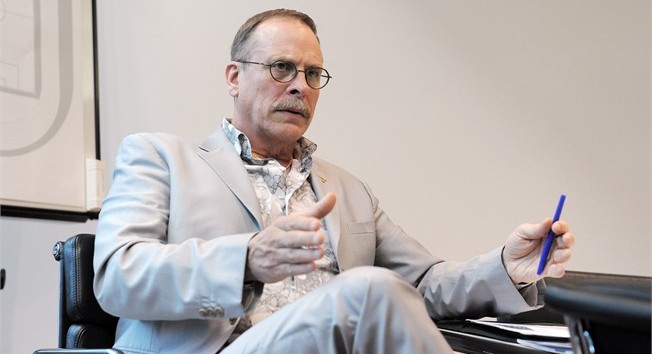By Andrew Warshaw
January 5 – The man leading the fight against worldwide match fixing has described the scale of the problem as “frightening” and reiterated his determination to beat the criminals.
Just days after FIFA’s head of security, Chris Eaton (pictured), revealed exclusively to insideworldfootball that more than 20 players had already started coming forward with vital information about the culprits, the outspoken Australian now says even more whistleblowers will be persuaded to provide details of illegal betting over the next few months.
On January 1, FIFA began its much-lauded information-gathering crackdown, offering amnesties and rewards for important incriminatory information.
FIFA have already set up an early warning system to detect suspicious betting patterns and has pledged €20 million (£17 million/$29 million) to Interpol over 10 years to help combat the problem.
“We never had so many national investigations running concurrently as we have today, with hundreds of players in prison and administrators under investigation,” said Eaton.
“If that’s not the cry for us to do something, then there’ll never be one.
“There are up to 50 active national investigations – one quarter of FIFA’s member associations.
“That’s frightening.
“Let’s do something about it.
“Let’s fight back.”
Eaton repeated his stance that some kind of United Nations charter could help the initiative to identify and punish the criminals.
“I can’t spend my life talking to individual police organisations,” he said.
“We need to escalate the drive for solutions to the global level, for instance the United Nations.
“What we need is an independent investigative ability across sports.
“You certainly need a match fixing code.
“FIFA is not against bookmaking or gambling, but as unintended victims, we are encouraging Governments collectively to make some sort of control mechanism over the unregulated gambling institutions, particularly in southeast Asia, where the amount of unregulated gambling dwarves regulated gambling.”
In a wide-ranging interview with FIFA’s website, Eaton, who used to work for Interpol, insisted he would eventually gain the upper hand against the criminals, some of whom have possibly even committed murder, he said.
“I’ve been involved in criminal investigations for 40 years and on an international level with Interpol for 12 years,” Eaton said.
“I am yet to meet a truly smart criminal.
“There are many far smarter people in the administration of FIFA for instance.
“There is certainly a need to address the issue of economic stability and vulnerability for players and referees.
“We have examples of players being intimidated and possible examples of players being killed as a result of their decision not to cooperate with criminals.
“In 2012, players, officials and even administrators will have a place to go – even anonymously – to tell their story, and that’s with the commencement of the amnesty, rewards and hotline programme.
“There will be a website, telephone number and a dedicated email-address – in all languages.
“We will do everything that will suit the person who wants to say something.”
Eaton, whose initiative includes a rehabilitation programme, revealed match fixing is reaching even the most high-profile fixtures including World Cup games.
“Match fixing can and does impact on qualifiers for FIFA competitions, and could impact on the global events themselves,” he said.
“Over 90 per cent of sport-related gambling in southeast Asia is on football matches, particularly international contests.
“One of the biggest risks is the World Cup qualifiers, particularly where competing teams do not believe they have a real chance of getting to the World Cup itself.
“A lot of people think of FIFA as a wealthy organisation.
“But it’s nowhere near as wealthy as the gambling organisations and bookmakers of the world who are feeding off football and from whom FIFA gets no benefit, has no access and no say.
“An Italian investigation into match fixing in that country is now over a year old, and up to €2 billion (£1.7 billion/$2.6 billion) has been identified as being the likely criminal income to two major criminal organisations, the Camorra and the Mafia.
“And remember, this is digital money.
“So there is no border transfer and no risk associated with importation, product problems or massive amounts of people you have to corrupt.
“So, up until now it has been low risk and high profits for them.
“We are creating a hostile environment for match fixers to make them realise we will expose them, name them, and make them subject to investigation somewhere in the world.”
Contact the writer of this story at zib.l1741642106labto1741642106ofdlr1741642106owedi1741642106sni@w1741642106ahsra1741642106w.wer1741642106dna1741642106
Related stories
December 2011: Exclusive – Footballers help FIFA gather match-fixing evidence
December 2011: Gold Cup matches may have been fixed, warns FIFA security chief
October 2011: FIFA’s head of security continues to encourage whistleblowers with rewards
August 2011: Exclusive – FIFA’s head of security calls for financial rewards for whistle-blowers

